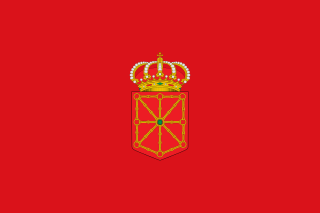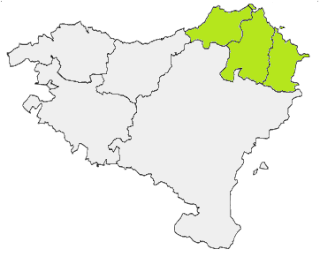External links
- (in Basque and Spanish) Official web page
HABE (Helduen Alfabetatze eta Berreuskalduntzerako Erakundea) (Institution for Adults Alphabetization and Revasconization) is a Basque government institution which works to help adults learn the Basque language. Since its inception in 1983, The Government of the Basque Autonomous Community has opened a network of euskaltegi , Basque language education centres. HABE was created in 1983 and since then it has opened 107 euskaltegis with 1500 teachers and over 350,000 students throughout the network. Additionally, roughly between 3000 and 4000 people outside of the Basque Country study Basque through HABE each year.
Its headquarters are on Vitoria-Gasteiz street, Donostia.
The Basques are a Southwestern European ethnic group, characterised by the Basque language, a common culture and shared genetic ancestry to the ancient Vascones and Aquitanians. Basques are indigenous to, and primarily inhabit, an area traditionally known as the Basque Country — a region that is located around the western end of the Pyrenees on the coast of the Bay of Biscay and straddles parts of north-central Spain and south-western France.
In grammar, the prolative case, also called the vialis case, prosecutive case, traversal case, mediative case, or translative case, is a grammatical case of a noun or pronoun that has the basic meaning of "by way of" or "via".

In Spain, an autonomous community is the first-level political and administrative division, created in accordance with the Spanish Constitution of 1978, with the aim of guaranteeing limited autonomy of the nationalities and regions that make up Spain.

Navarre, officially the Chartered Community of Navarre, is a foral autonomous community and province in northern Spain, bordering the Basque Autonomous Community, La Rioja, and Aragon in Spain and Nouvelle-Aquitaine in France. The capital city is Pamplona. The present-day province makes up the majority of the territory of the medieval Kingdom of Navarre, a long-standing Pyrenean kingdom that occupied lands on both sides of the western Pyrenees, with its northernmost part, Lower Navarre, located in the southwest corner of France.

Bilbao is a city in northern Spain, the largest city in the province of Biscay and in the Basque Country as a whole. It is also the largest city proper in northern Spain. Bilbao is the tenth largest city in Spain, with a population of 345,141 as of 2015. The Bilbao metropolitan area has 1,037,847 inhabitants, making it one of the most populous metropolitan areas in northern Spain; with a population of 875,552 the comarca of Greater Bilbao is the fifth-largest urban area in Spain. Bilbao is also the main urban area in what is defined as the Greater Basque region.

Basque nationalism is a form of nationalism that asserts that Basques, an ethnic group indigenous to the western Pyrenees, are a nation and promotes the political unity of the Basques, today scattered between Spain and France. Since its inception in the late 19th century, Basque nationalism has included separatist movements.

The Ertzaintza, is the autonomous police force for the Basque Country, largely replacing the Spanish Policía Nacional and Guardia Civil. An Ertzaintza member is called an ertzaina.

The Basque Nationalist Party, officially Basque National Party in English, is a Basque nationalist and regionalist political party. The party is Christian-democratic, with social-democratic and conservative-liberal factions. It operates in all the territories comprising the Basque Country: the Basque Autonomous Community and Navarre in Spain, and in the French Basque Country. It also has delegations in dozens of foreign nations, specifically those with a major presence of Basque immigrants.

The Basque Country is the name given to the home of the Basque people. The Basque country is located in the western Pyrenees, straddling the border between France and Spain on the coast of the Bay of Biscay. Euskal Herria is the oldest documented Basque name for the area they inhabit, dating from the 16th century.

Negu Gorriak were an underground Spanish group from the Basque Autonomous Community. Their musical style combines various styles of rock music such as hardcore punk, hip-hop, ska, and reggae, although it is impossible to separate the band from its political ideology and its identification with the Basque Country and its language (Euskara).

Euskaltzaindia is the official academic language regulatory institution which watches over the Basque language. It conducts research, seeks to protect the language, and establishes standards of use. It is known in Spanish as La Real Academia de la Lengua Vasca, in French as Académie de la Langue Basque, in Navarro-Aragonese as Reyal Academia d'a Luenga Vasca and in Gascon as Académia Reiala de la Lenga Basca.

.cat is a sponsored top-level domain intended to be used to highlight the Catalan language. Its policy has been developed by ICANN and Fundació puntCAT. It was approved in September 2005.

The French Basque Country, or Northern Basque Country is a region lying on the west of the French department of the Pyrénées-Atlantiques. Since 1 January 2017, it constitutes the Basque Municipal Community presided over by Jean-René Etchegaray.

The University of the Basque Country is a Spanish public university of the Basque Autonomous Community. Heir of the University of Bilbao, initially it was made up of the Faculty of Economic and Business Sciences of Sarriko (1955), Medicine (1968) and Sciences (1968). Following the General Law of Education (1970), the Nautical School (1784), the School of Business Studies of Bilbao (1818) and the Technical Schools of Engineers (1897) joined in, until it grew into the complex of thirty centers that compose it presently.
An ikastola is a type of primary and secondary school in the Basque Autonomous Community, Navarre and the French Basque Country in which pupils are taught either entirely or predominantly in the Basque language. Ikastolak can be nowadays either private or public, divided into different networks.

Luis Aranberri, better known as “Amatiño”, is one of the media professionals that best represents the new school of journalism in the Basque language, or Euskara, which emerged around 1970 and which, in step with the creation of the Basque Country’s own institutions, was accompanied by the development and consolidation of a Basque news arena that was practically non-existent up to barely one generation ago.

The Basque Country, also called Basque Autonomous Community, is an autonomous community in northern Spain. It includes the Basque provinces of Álava, Biscay, and Gipuzkoa.

Ikerbasque, the Basque Foundation for Science, is a foundation promoted by the Basque Government in 2007 to contribute to the development of scientific research in the Basque Country by attracting researchers of excellence and consolidating careers, as well as actions to boost research. Its first scientific director was Mª Carmen Gallastegui, a professor of economics at the University of the Basque Country. In July 2009, she was replaced by Professor Fernando Cossío. Ikerbasque celebrated its 10th anniversary in 2017.

The political division of the Kingdom of Spain is defined in Part VIII of the Spanish constitution of 1978, which establishes three levels of territorial organization: municipalities, provinces and autonomous communities, the first group constituting the subdivisions of the second, and the second group constituting the subdivisions of the last. The State guarantees the realization of the principle of solidarity by endeavouring to establish an economic balance between the different areas of the Spanish territory.

The Basque Summer University is a university institution created in 1973, which offers university courses in collaboration with the University of the Basque Country, Mondragon University, Public University of Navarra, the University of Pau and Pays de l'Adour in Bayonne, and Basque Wikipedia.